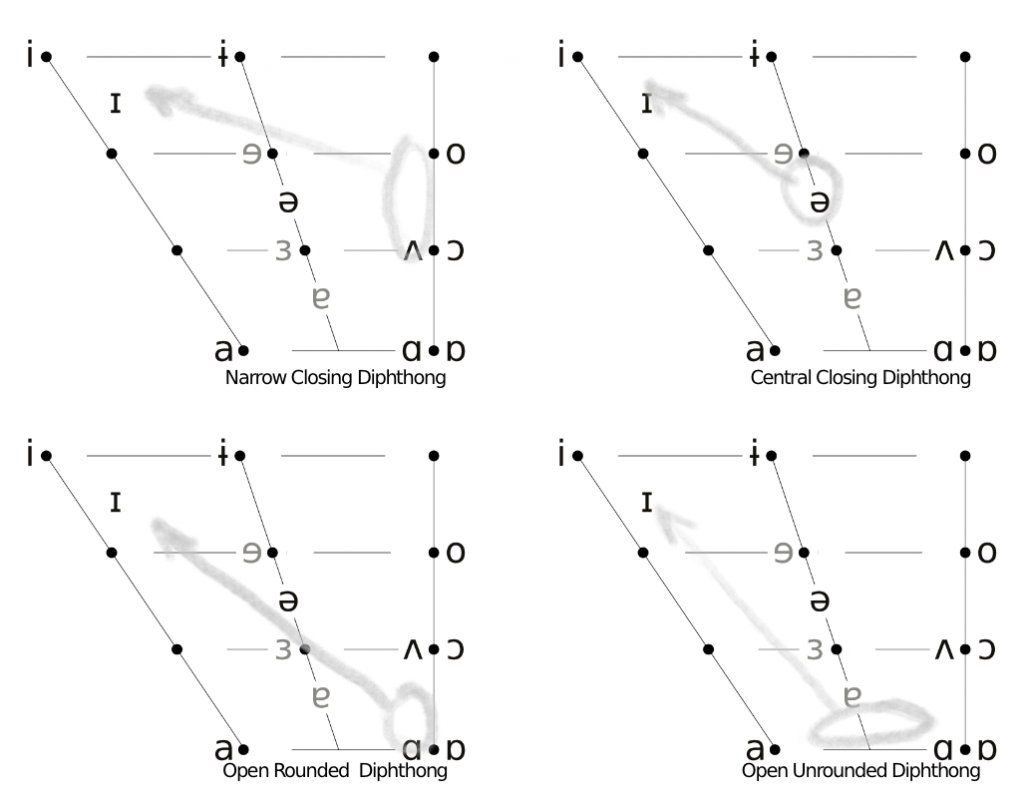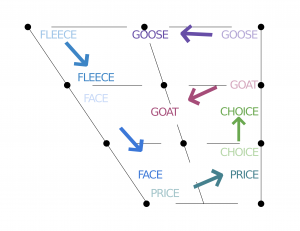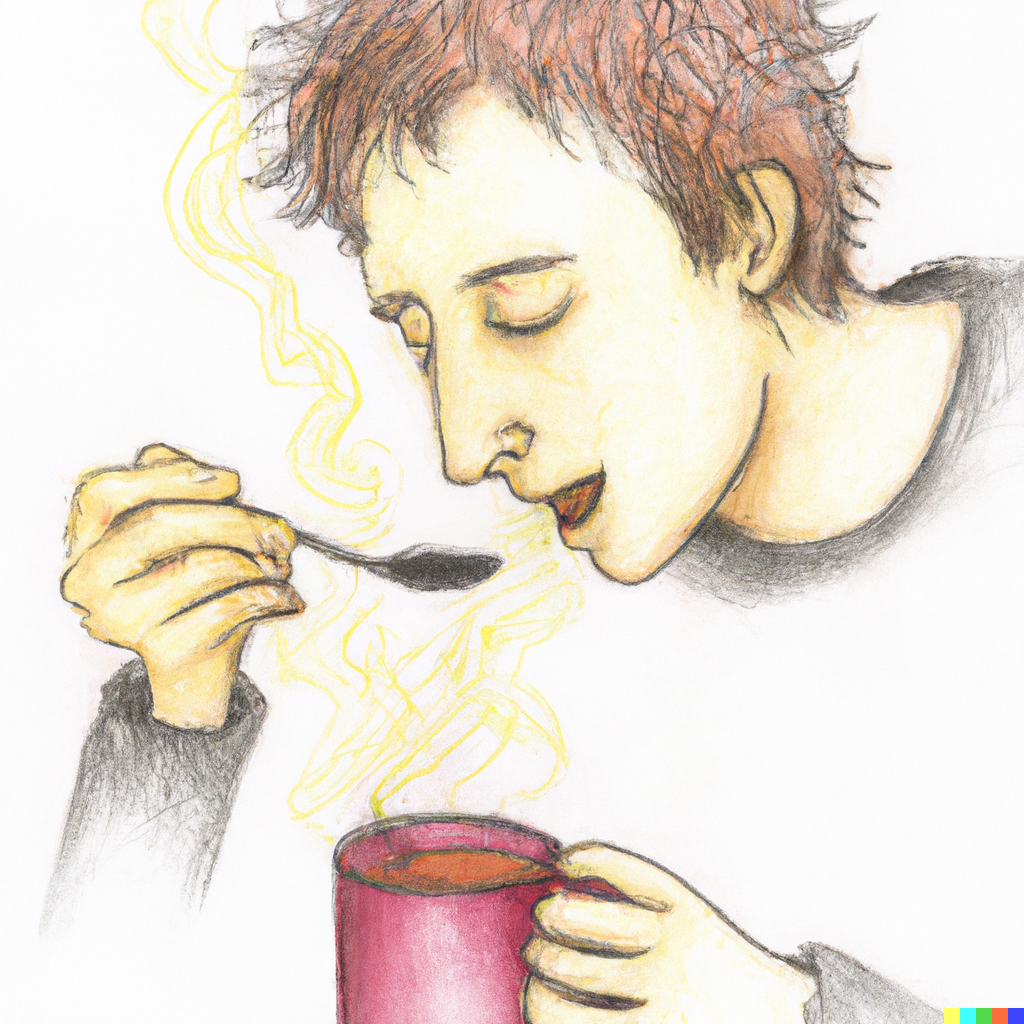17 The CHOICE Lexical Set
A Closing Diphthong goes from wherever the nucleus starts to a close coda. The most common type of choice is a closing diphthong, where the nucleus of the diphthong is mid back [ɔ ~ o], which then off-glides towards [ɪ̯], so we have [ɔɪ̯ ~ oɪ̯]. There is a lot of agreement between accents on the Lexical Incidence of which words have choice, so identifying which words have this vowel is usually quite simple, even for those who have a merger of choice with another set, usually price. It should be noted that choice words are not high frequency words, and that they come up in samples of speech far less often than words from other lexical sets.
choice can be in both Free and Checked syllables, both stressed and unstressed. Many choice vowels in unstressed syllables are the result of compound words, such as ballpoint, multiple-choice, topsoil.
- 🕊 Free: does not require a following consonant, and can exist on its own, e.g. Oy!
- in stressed and unstressed syllables

Spellings
choice: ‹oi, oiCe, oy›, as in joist, voice, boy
Though Wells sets out 3 sub-groups for choice, they represent historical divisions in choice based on the merging of pronunciations of [ɔi, ui, i] in the 19th century that have no impact on contemporary accents. It is interesting that all choice words were initially loan words from other languages, mostly French. I have decided to ignore Wells’ sub-grouping here, and refer anyone who is working on historical accents before the 19th century to Wells’ analysis.
Pronunciations

The most common type of choice is a closing diphthong, where the nucleus of the diphthong is mid back [ɔ ~ ɔ̝ ~ o̞ ~ o], which then off-glides towards [ɪ̯ ~ i̯], so we have [ɔɪ̯ ~ ɔ̝ɪ̯ ~ o̞ɪ̯ ~ oɪ̯] or [ɔi̯ ~ ɔ̝i̯ ~ o̞i̯ ~ oi̯]. The raised variant, with [o] as nucleus, happens in Southern Hemisphere Englishes (Australia, New Zealand, South Africa), in part as a response to the opening of face [æɪ̯], and the backing and rounding of price [ɒɪ̯]; this process is known as a push chain shift.
There are three other variants for choice, some of which may be merged with price: a mid-centralized version of [əɪ̯] heard, for example, in parts of Newfoundland; an open rounded version, [ɒɪ̯], which one might hear in Ireland and parts of Southern England; and an open, unrounded version, [aɪ̯ ~ ɑɪ̯] that one hears in parts of the Caribbean.
Perhaps it comes as no surprise that there is a monophthongal variant of choice, found in the South of the US. This appears to mostly be an allophonic change, in the environment of choice + /l/ or /s/, such as boil, oil, spoil, toilet, or moisture, oyster, voice. The Atlas of North American English states that “Glide deletion” of choice is well recognized by Southerners, and that, though it is “more common in the eastern section of the South, it is not concentrated in any one geographic area” (Labov et al, 252).
The nucleus of choice is usually more advanced than the nucleus of mouth, but not always. In cases where choice’s nucleus is back and mouth’s is front, as we find in London, New Jersey and Philadelphia accents, we have the choice–mouth Crossover, as Wells dubbed it.
Personal Pronunciation
Note that a diphthong is a movement of the tongue, a closing by raising the middle of your tongue up toward the roof of your mouth in the direction of where you make the /j/ consonant. Of course, you never make it that far, and generally speakers cut off the diphthong somewhere between [ɪ̯̽ ~ ɪ̯ ~ i̯]. If you have a monophthong for choice, it is likely that it will only occur before either /ɫ/ or /s/. Test this out with words like oil, toilet, spoil, soil, coil or choice, voice, Joyce, oyster, moisture.
Monophthong or Closing Diphthong: Now that we’ve figured out whether you have a diphthong or a monophthong, let’s try to figure out what is your specific vowel quality for the start of choice, in either case. Begin by exploring the word boy. Even before you say it, notice the action of your lips as you shape the /b/: are they rounded? Compare with the word bee—which is likely to be unrounded, so there is likely a contrast of the /b/ shape in these two words, as you anticipate the action of the vowel that follow.
Now, back to boy, but now disregard the /b/, and pay less attention to your lips. Your focus now should be on the arching of your tongue, the peak of which could be fairly far back. If it’s a diphthong, lengthen the nucleus, the beginning of the diphthong; it’s unlikely to be a monophthong, but if it is, just hang out there for a moment. What vowel shape is it? If your pitch drops as you say it, it can help to intone the sound on one “note” or pitch so you don’t get distracted by the change of melody. Use an audio or video recorder to experiment on your own, or work with a coach, teacher, classmate or friend to identify how your choice compares with someone else’s choice. Next, subtly shift the physical placement of your tongue at the beginning of choice around in your vowel space (your mouth!) in tiny steps —up, forwards, down, and back—before rising up to your offglide if you have one. You should feel the top surface of the middle-back of your tongue moving delicately up and down as you experiment while keeping your tongue tip behind your lower front teeth. Notice how your tongue moves towards/away from your hard palate/velum and alveolar ridge, making more or less space near the front of your mouth.
Back (and Rounded?) variations: Explore the vertical dimension with your lips rounding forward, from a rounded [ɔ̞] sliding through rounded [ɔ, ɔ̝ o̞, o, o̝], etc., slowly moving higher and more close. Then explore a more open, but rounded (?) pronunciation, with [ɒ̝, ɒ, ɒ̞, ɑ̝, ɑ, ɑ̞ ]. Can you find a starting place that matches your speech? Once you’ve locked onto it, rock up and down, above and below, more close, more open. Is this your starting spot? Compare choice with rounded goat and thought (how does boy sound when followed by boat and bought?), and see how great the contrast is between the nuclei of these vowel sounds. If none of the open options work for you, explore whether choice and price are merged—might starting near [a] be a better beginning?
Unrounded Central variation: with your lips relaxed, explore the vertical dimension from [ɐ̞], sliding up towards [ɐ, ɐ̝, ɜ̞, ɜ, ɜ̝, ə̞, ə, ə̝], slowly moving higher and more close. Then explore going lower, sliding down towards [ə̞, ɜ̝, ɜ, ɜ̞, ɐ̝, ɐ, ɐ̞], slowly moving lower and more open.Try to find where your choice sound begins. Once you’re sure of where it is, shift the value of it up and down very slightly, above and below, more open, more close. Be confident in where yours is and isn’t. Compare choice with unrounded strut and comma (compare the start of the vowel in boy with butt and abbot ), and with rounded thought and lot (compare tight/tied with bought and robot ), and see how great the contrast is between the nuclei of these vowel sounds.
Offglide: Let’s turn our attention to the offglide, assuming you’ve got one at least part of the time. Where does choice end? Due to the reduced quality of an offglide, which tends to be quieter, this is much harder to ascertain than the nucleus of a diphthong. When speakers focus on their offglide they often over-emphasize it; when they are being more emphatic, they may resort to a more extreme articulation of the offglide, and in distorting it, could easily miss the true nature of its vowel quality.
 It might be worth recording some words, such as ones at the end of a word as in boy, toy, enjoy, Roy, or avoid, noise, Lloyd at regular speed and then using software (such as the free Audacity app and the “Effect>Change Tempo…” menu item) to slow down the word in order to hear what’s going on. It’s always best to put the word you’re exploring in the middle of a phrase when you do this, as words at the beginning or end of a phrase can be affected by prosodic effects. Something like “The word ____ sounds cool” should get you an undistorted pronunciation. (Note: avoid following your choice word with a vowel, as in a phrase like “The word ___ is interesting.” That may lead you to say your offglide with a much more close articulation, often veering into the territory of /j/, such as [ðə wɝd ˈbɔj ɪz ˈɪntɹəstɪŋ]
It might be worth recording some words, such as ones at the end of a word as in boy, toy, enjoy, Roy, or avoid, noise, Lloyd at regular speed and then using software (such as the free Audacity app and the “Effect>Change Tempo…” menu item) to slow down the word in order to hear what’s going on. It’s always best to put the word you’re exploring in the middle of a phrase when you do this, as words at the beginning or end of a phrase can be affected by prosodic effects. Something like “The word ____ sounds cool” should get you an undistorted pronunciation. (Note: avoid following your choice word with a vowel, as in a phrase like “The word ___ is interesting.” That may lead you to say your offglide with a much more close articulation, often veering into the territory of /j/, such as [ðə wɝd ˈbɔj ɪz ˈɪntɹəstɪŋ]
For closing diphthongs, this vowel will be quite close, in the range of [ɪ], [i], or [ɨ]. In some accents, the offglide is more mid-central, around [ɪ̽] or [ə].
Transcribing choice: Decide which vowel symbol best suits the nucleus of choice in your speech:
If your choice nucleus is… (use whichever vowel symbol is appropriate for you)
- high, use the raised diacritic [ ɔ̝ ], a small T pointing up
- open, use the lowered diacritic [ o̞ ], a small T pointing down
- pushed forward, use the advanced diacritic [ ɔ̟ ], a tiny plus sign +
- pulled back, use the retracted diacritic [ ɜ̠ ], a tiny minus sign –
- having only minimal lip-rounding, use the unrounded diacritic on a normally rounded symbol [ɒ̜] or the rounded diacritic on a normally unrounded one [ɑ̹]
If you have a closing choice diphthong, your coda/offglide will likely be unrounded
- close front, so use a lower-case i, [ i̯ ]
- near-close near-front, so use a small-cap i [ ɪ̯ ]
- mid-centralized near-close near-front, so use a small-cap i with the small x diacritic[ ɪ̯̽ ]
Alternate Pronunciations
Experiment with the choice Word Lists, Phrases and Sentences with the following choice options:
As you move the vowels in these directions, see whether that modified oral posture might inspire you to move the articulation of consonants and other vowels in the word in similar ways. Does it remind you of an accent other than your own?
Word Lists for choice in a Free Syllable, at the end of a word
KEY: ◾︎ choice in stressed syllable ◽︎ choice in unstressed syllable
Word Lists for choice in a Free Syllable, followed by comma (schwa)
KEY: ◾︎ choice in stressed syllable ◽︎ choice in unstressed syllable
Word Lists for choice in a Free Syllable, followed by letter (schwa+r)
KEY: ◾︎ choice in stressed syllable ◽︎ choice in unstressed syllable
Word Lists for choice, sorted by the consonant that follows
KEY: ◾︎ choice in stressed syllable ◽︎ choice in unstressed syllable
PLOSIVES
-p
-b
-t
-d
-k
-ɡ
AFFRICATES
-tʃ
-dʒ
NASALS
-m
-n
-ŋ
FRICATIVES
-θ
-ð
-f
-v
-s
-z
-ʃ
-ʒ
-l/ɫ
-ɹ
-w
-j
Short Phrases
- An Android exploit.
- An embroidered poinsettia.
- His career was destroyed by steroids.
- We sang the introit joyfully.
- They caught typhoid from eating bad oysters.
- The Royals demand loyalty.
- What’s a Deutschmark coin worth?
- Alloy rims with Uniroyal tires.
- A lawyer* from Detroit Illinois.
- The voyager annoyed the cowboy.
- Floyd liked beef tenderloin more than sirloin.
- I enjoy boiling-hot Rooibos tea.
- Joyce’s poignant voice.
- Paranoid Moira was coyer than Leroy.
- James McAvoy toyed with the idea of joining the Royal Navy.

Sentences
Level 1
Short with 2-3 words, underlined
- Mr. Boyd replaced the oil in my Rolls-Royce.
- The Reuters reporter loitered by the convoy.
- The viceroy was deployed to Hanoi.
- Being called a maladroit Poindexter made me paranoid.
- The poisonous snake coiled around the coypu.
Level 2
Short with 4-5 words, underlined
- Miss Gilroy took a joyride with her boyfriend in the Bois de Boulogne.
- Avoid pointing at Moynihan’s injured groin!
- Pete’s foible was taking Polaroids of purloined pointillist paintings.
- The pork tenderloin was prepared with boiled peanuts, soy sauce, and sesame oil.
- Freud employed the term scopophilia and avoided “voyeurism”.
Level 3
Medium with 3-4 words, not underlined
- The droids and the moisture farmer were brought to the star destroyer at gunpoint.
- Sawyer was overjoyed with their new coir rug.
- The cloying sweetness of Hawick candies, a boiled peppermint sweet, is annoying.
- The tabloids were devoid of information on perestroika.
- The humanoids on this toroid asteroid wear celluloid spacesuits.
Level 4
Hard with 4-6 words, not underlined
- Dan Aykroyd did point-counterpoint with Jane Curtin before doing Dr. Detroit.
- Dr. Conroy avoided the parathyroids while removing my thyroid gland.
- Corticosteroids and nonsteroidal anti-inflammatories are given for rheumatoid arthritis, not opioids!
- The two employees said they “boinked” after leaving the Sheboygan clip joint.
- Tessa Virtue and Scott Moir skated joyously to Pink Floyd and a song from The Boyfriend.
Mergers
The choice–nurse (Voice-Verse) Merger In the Historical NYC working class accent, nurse words are non-rhotic and have a closing offglide, [ɜɪ̯]. This is sometimes described as the “toity-toid street” accent[1] (as in “33rd St.”) and is now essentially extinct. There is also a nurse–choice Hypercorrection which occurs on occasion where choice words are said with the nurse vowel [ɝ], as in “You say oysters and I say ersters” in the Gershwin song “Let’s Call the Whole Thing Off”. My favorite is “soylern”, for “sirloin”, which combines both the merger and the hypercorrection. Minimal pairs include: boy/burr, oil/earl, voice/verse, oil/Earl, oily/early, Boyd/bird, coil/curl, loin/learn, poise/purrs, etc. Experiment with choice–nurse in this sentence:
-
- Earl Boyd curled his lip at the bird as he coiled the oily rope.
- Emeka joined the journalism club because he enjoyed being creative with words.
- Noé gave his boyfriend the perfect gift; a trip to where they first met and a feast of oysters.
- The singer’s voice was heard echoing from a void on stage and then she emerged for the second verse.
price–choice (Bile-Boil or Line-Loin) Merger: price and choice are merged in some varieties of English—known colloquially as the line–loin or bile-boil merger—as heard in part of the South of England, Ireland, the Caribbean, and Newfoundland. In many of these cases, price and choice are pronounced with a pronunciation that is shaped beginning in the middle of the mouth and offgliding to [ɪ̯], e.g. [əɪ̯]. Other options for the nucleus are [a] and [ɑ].
If you have this merger, then try to differentiate the price from mouth words in this sentence by rounding mouth’s offglide to [ʊ̯]. You can also explore modifying the nucleus of both or either one, with options such as price [ a, ɑ ] and/or mouth [ æ, a, ɑ ].
price vs. choice: by=buy/boy, kind/coined, tie=Thai/toy, pint/point, I’ll/oil, Kylie/coyly
-
- Kylie would coyly buy the boy a toy she bought in Thailand.
- I’ll point out that you implied that I had lied to Lloyd about the pint of oil you employed.
- A kind person helped me pick up my coins and they weren’t annoyed that I held up the line.
- Our employer said we were required to accept the invite to the meeting in Detroit.
- In the summer, Kylie often put lemon juice and castor oil in her hair and wrapped it with tin foil to achieve “natural” highlights.
choice+/l/—thought + /l/ (Boil-Ball): This allophonic rule has choice before final /l/ becoming a monophthong, in words such as oil, toilet, spoil. Some Southern US accents with this feature merge these words with thought + /l/, so that we get homophones/minimal pairs with oil/all, soil/Saul, foil/fall, coil/call, recoil/recall, toil/tall, broil/brawl. If you have this allophonic merger, try to make the minimal pairs contrast by focusing on the choice offglide towards [ɪ̯], or focus on completing the diphthong before moving towards the /l/, and you might also check the quality of that final /l/, as it is frequently vocalized (said as a vowel). If you would like to try this merger, explore the vowel choices [ɔ] or [ɒ], and go directly to a very dark [ɫ], or even to the unround back close vowel [ɯ]. Experiment using these choice–thought sentences:
-
- During his fall, Saul spilled all the olive oil from the foil packet onto the soil.
- The man recoiled when he recalled how he became embroiled in the brawl.
- Paul spoilt the movie for Doyle before they even stepped foot in the mall.
- I had to buy an all-new set of beauty creams, essential oils, and other toiletries while on holiday in Malta.
- Their golfing trip was foiled after Boyle shot a ball into a window.
Splits
There are no known Splits with choice.
Review
- This accent is exemplified by The Dead End Kids in Angels with Dirty Faces (1938) https://youtu.be/7q-oU6wAx4A?t=80⧉ ↵
A diphthong where the mouth/tongue closes from the nucleus (which is more open) to the coda (which is more close). The opposite is an opening diphthong.
The lexicon of words that a lexical set occurs in. Often different accents will have words distributed differently between lexical sets.
A phonological change within an accent where a phoneme moves into the space vacated by another phoneme that has already moved. These can include multiple items as moving in concert. There are two sorts of "chain shifts", push shifts, and drag/pull shifts.
The sound of a particular vowel which result from the positions of the vocal tract, including tongue, the lips, and the velum, as well as the pharynx, and larynx (to a lesser degree) during its articulation.

